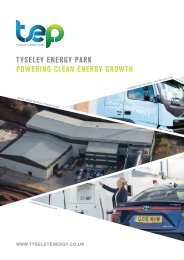connected-clusters-report-energy
Clustering innovation to create thriving and prosperous low-carbon cities and regions
Clustering innovation to create thriving and prosperous low-carbon cities and regions
You also want an ePaper? Increase the reach of your titles
YUMPU automatically turns print PDFs into web optimized ePapers that Google loves.
University of Birmingham | Climate-KIC 13<br />
Development of the cluster<br />
Creation<br />
In 2006 the AVAESEN cluster was established<br />
out of the willingness of companies in the<br />
<strong>energy</strong> sector to collaborate by creating<br />
a physical location in order to attract new<br />
members. The initial aims were to act as a<br />
spokes-body for businesses within the sector,<br />
an idea which was also strongly supported<br />
by regional government, creating an<br />
effective lobby. It faced challenges in how to<br />
brand itself, how to navigate the composition<br />
of the sector and how to position the sector<br />
into the future. It overcame this initial set<br />
of challenges through communication,<br />
conferencing, publicity, involvement in<br />
regional government and creating and<br />
sharing business opportunities.<br />
Growth<br />
The cluster continued to grow for<br />
twelve months. At its peak, the cluster had<br />
235 companies. However, in 2007 Spain<br />
entered a recession associated with the<br />
2007–2008 financial crisis. This set the tone<br />
for the cluster’s subsequent development.<br />
The financial crisis meant that government<br />
at all levels had to undergo budget cuts.<br />
Regional government in Spain is responsible<br />
for running and financing most of the local<br />
services, and subsequently they accrued<br />
a large amount of debt, which meant that<br />
significant budget cuts were instigated.<br />
This was mirrored at the national level.<br />
This meant that the cluster, which up until this<br />
point had been reliant on funding from both<br />
national and regional government, faced a<br />
budget crisis of its own. In order to cut back on<br />
expenditure, government funding for <strong>clusters</strong><br />
was stopped completely in 2012. Funding for<br />
the renewable <strong>energy</strong> sector was subjected<br />
to a series of cuts in 2008, 2011 and 2013,<br />
with 20 years’ worth of forward funding being<br />
slashed from the pipeline. As a consequence<br />
of this evaporation of government support,<br />
international investment and pension funds lost<br />
confidence in the Spanish renewable <strong>energy</strong><br />
sector and ceased to invest.<br />
This complete change in confidence in the<br />
renewable <strong>energy</strong> sector led it towards severe<br />
decline. At AVAESEN alone, the number of<br />
member SMEs fell from 235 to less than 100.<br />
In 2013, the new incoming manager,<br />
Bianca Dragomir, inherited a workforce of<br />
two employees, a bank account with €1,000,<br />
a total debt of €600,000 and a cluster funding<br />
model dependent on government funding that<br />
no longer existed. The solution to ensuring the<br />
cluster’s survival was to simultaneously tackle<br />
the immediate issues of saving its members<br />
from collapse whilst saving the cluster<br />
organisation itself from collapse. The actions<br />
taken were twofold; first the funding model<br />
was changed, and secondly business creation<br />
activities were prioritised.<br />
The funding model was converted from a<br />
public-private partnership reliant on subsidy<br />
to a self-sustaining service provider.<br />
This was achieved by administering ‘Tailored<br />
Action Plans’ (TAPs). The TAP model was<br />
fee based; SMEs paid the cluster on a<br />
‘no cure, no fee’ basis. The cluster assessed<br />
the SMEs’ interests, needs and future plans<br />
and subsequently presented them with<br />
what the cluster could offer them: context, a<br />
personalised agenda, funding advice, innovation<br />
and internationalisation opportunities, all based<br />
on their specific profile. SMEs were also given<br />
the opportunity to attend meetings with ten<br />
different potential partners. To date, no SME<br />
has requested a refund, and the cluster<br />
has been able to finance itself in a<br />
self-sustaining manner.<br />
Business creation had to be prioritised at<br />
AVAESEN, as otherwise the base on which it<br />
was built would have ceased growing, leaving<br />
it with no-one to supply expertise and support<br />
services. In order to rebuild the regional,<br />
innovation-driven, cleantech sector, the cluster<br />
launched Spain’s first cleantech accelerator.<br />
Through the Climate-KIC Accelerator<br />
Programme this has grown in number and scale<br />
year on year. Now in its fifth year, it operates on<br />
a national scale. AVAESEN went on to become<br />
the leading partner of the world’s largest green<br />
business idea competition, ClimateLaunchpad.




